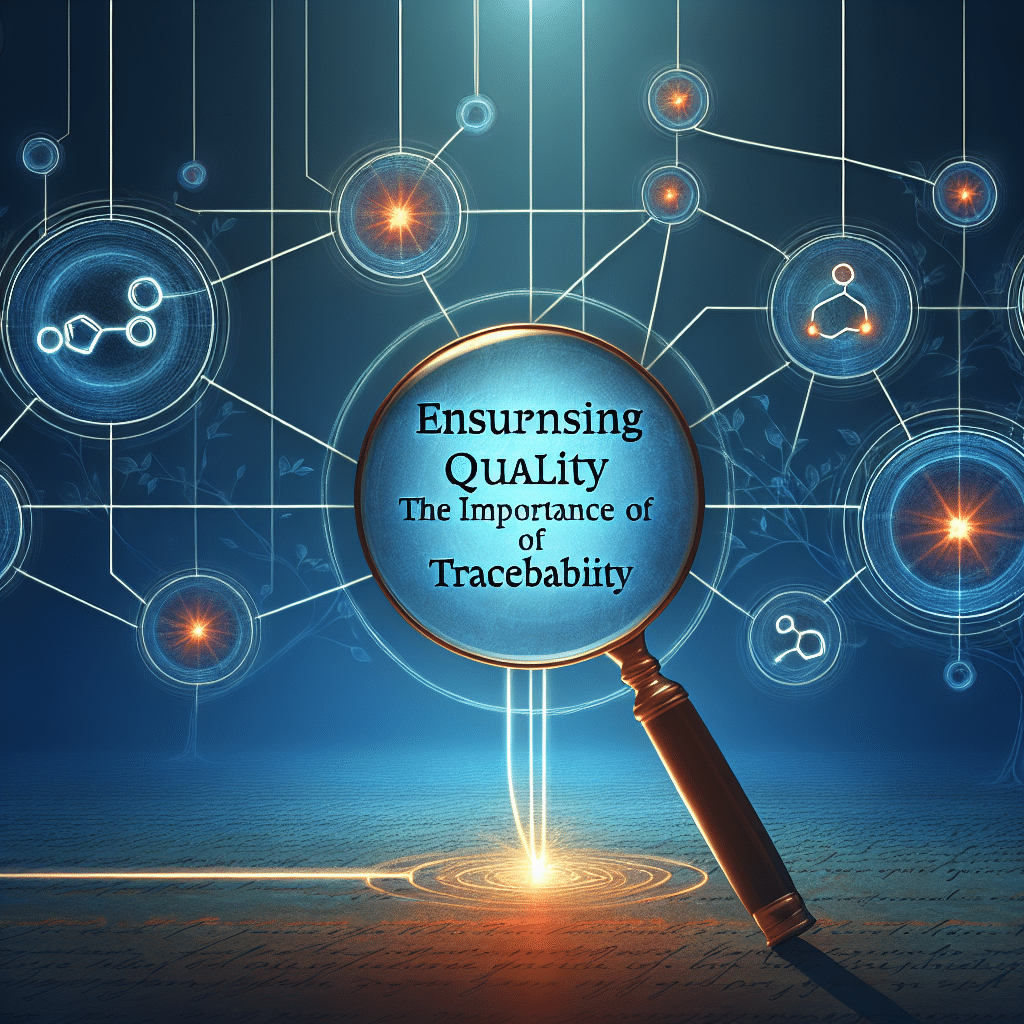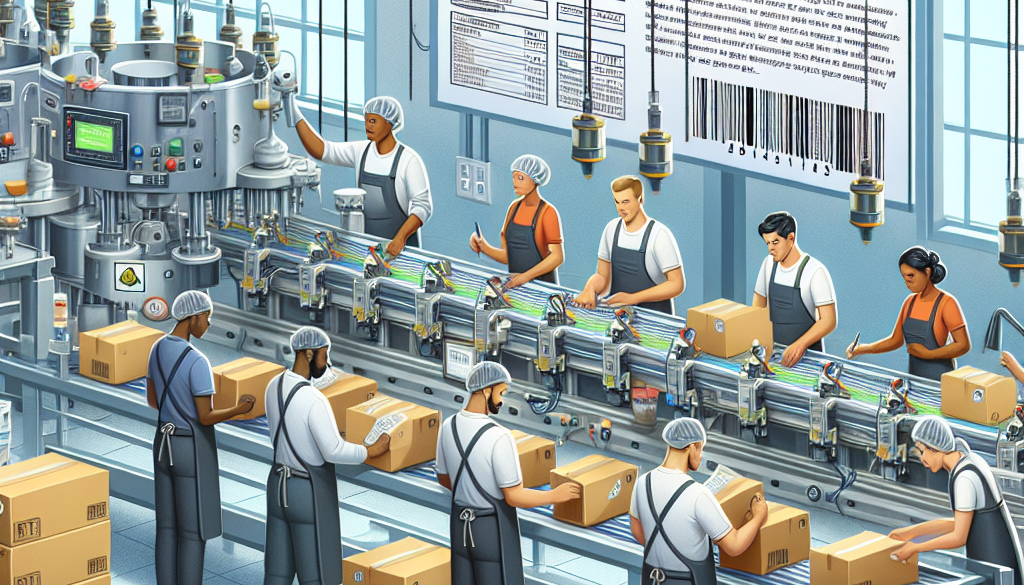Ensuring Quality: The Importance of Traceability
-
Table of Contents
- Traceability in Quality Assurance: A Critical Component for Consumer Safety
- Understanding Traceability
- Why Traceability Matters
- Traceability in Action: Case Studies and Examples
- Food Industry
- Pharmaceuticals
- Automotive
- Implementing Traceability Systems
- Challenges and Considerations
- Statistics Highlighting the Importance of Traceability
- Conclusion: The Integral Role of Traceability in Quality Assurance
- ETprotein: Your Partner for High-Quality Protein Products
Traceability in Quality Assurance: A Critical Component for Consumer Safety

In an era where consumer awareness and demand for transparency are at an all-time high, traceability has become a cornerstone of quality assurance across various industries. From the food we eat to the products we use daily, understanding the journey of a product from its origin to the end-user is crucial for ensuring safety, quality, and compliance with regulatory standards. This article delves into the importance of traceability, its impact on different sectors, and how it serves as a fundamental aspect of maintaining high-quality standards.
Understanding Traceability
Traceability refers to the ability to track every step in the production and distribution chain of a product. It involves documenting the history, location, and application of an item by means of recorded identification. Traceability systems are designed to provide a clear and comprehensive trail that can be followed to ascertain the origin, transformation, and eventual destination of goods or components.
Why Traceability Matters
Traceability is not just a buzzword; it’s a critical component of modern business practices for several reasons:
- Consumer Safety: Traceability helps in quickly identifying and addressing the source of defects or contamination in products, thereby preventing harm to consumers and reducing the risk of widespread health issues.
- Regulatory Compliance: Many industries are governed by strict regulations that require traceability to ensure that products meet legal standards for safety and quality.
- Brand Protection: By ensuring product integrity, companies can protect their brand reputation and maintain consumer trust.
- Supply Chain Efficiency: Traceability systems can improve the efficiency of supply chains by reducing errors, minimizing waste, and optimizing inventory management.
Traceability in Action: Case Studies and Examples
Several industries have successfully implemented traceability systems to enhance quality control. Here are a few examples:
Food Industry
In the food sector, traceability is vital for tracking the source of ingredients, especially in the event of a foodborne illness outbreak. For instance, the 2013 horsemeat scandal in Europe highlighted the need for more stringent traceability measures. As a result, the European Union implemented more robust tracking systems to prevent such incidents in the future.
Pharmaceuticals
The pharmaceutical industry relies on traceability to ensure the authenticity of drugs and to combat counterfeit medications. The Drug Supply Chain Security Act (DSCSA) in the United States mandates a system to track prescription drugs as they move through the supply chain.
Automotive
Automotive manufacturers use traceability to recall specific batches of cars with defective parts, thereby ensuring consumer safety and compliance with safety standards.
Implementing Traceability Systems
Developing an effective traceability system involves several key steps:
- Identifying critical tracking points within the supply chain.
- Implementing technologies such as barcodes, RFID tags, or QR codes for data collection.
- Establishing a centralized database to store and manage traceability data.
- Ensuring all stakeholders in the supply chain have access to the necessary tools and training.
Challenges and Considerations
While traceability systems are essential, they also come with challenges:
- Cost of implementation and maintenance of traceability systems.
- Complexity of supply chains, especially in global markets.
- Data privacy and security concerns.
- Standardization of traceability protocols across different regions and industries.
Statistics Highlighting the Importance of Traceability
Recent studies and surveys underscore the significance of traceability:
- A survey by the Food Marketing Institute revealed that 75% of consumers are more likely to buy a product that provides transparency.
- The Global Food Traceability Center states that the ability to trace a product back to its source can reduce the impact of food recalls by up to 50%.
Conclusion: The Integral Role of Traceability in Quality Assurance
Traceability is not just a tool for compliance; it’s a strategic asset that can enhance product quality, protect consumers, and build brand loyalty. By investing in robust traceability systems, companies can gain a competitive edge while contributing to a safer, more transparent market.
ETprotein: Your Partner for High-Quality Protein Products
If you’re in the market for high-quality protein products with assured traceability, ETprotein is your go-to source. ETprotein’s commitment to quality and transparency is evident in their extensive range of protein products, including organic rice protein, pea protein, and various seed proteins. With a focus on non-GMO, allergen-free ingredients, and L-(+)-Ergothioneine with purity over 98%, ETprotein caters to industries such as nutraceuticals, pharmaceuticals, cosmeceuticals, and food and beverage. For more information or to sample their products, please contact them at sales(at)ETprotein.com today.
About ETprotein:
ETprotein, a reputable protein and L-(+)-Ergothioneine (EGT) Chinese factory manufacturer and supplier, is renowned for producing, stocking, exporting, and delivering the highest quality organic bulk vegan proteins and L-(+)-Ergothioneine. They include Organic rice protein, clear rice protein, pea protein, clear pea protein, watermelon seed protein, pumpkin seed protein, sunflower seed protein, mung bean protein, peanut protein, and L-(+)-Ergothioneine EGT Pharmaceutical grade, L-(+)-Ergothioneine EGT food grade, L-(+)-Ergothioneine EGT cosmetic grade, L-(+)-Ergothioneine EGT reference grade and L-(+)-Ergothioneine EGT standard. Their offerings, characterized by a neutral taste, non-GMO, allergen-free attributes, with L-(+)-Ergothioneine purity over 98%, 99%, cater to a diverse range of industries. They serve nutraceutical, pharmaceutical, cosmeceutical, veterinary, as well as food and beverage finished product distributors, traders, and manufacturers across Europe, USA, Canada, Australia, Thailand, Japan, Korea, Brazil, and Chile, among others.
ETprotein specialization includes exporting and delivering tailor-made protein powder and finished nutritional supplements. Their extensive product range covers sectors like Food and Beverage, Sports Nutrition, Weight Management, Dietary Supplements, Health and Wellness Products, and Infant Formula, ensuring comprehensive solutions to meet all your protein needs.
As a trusted company by leading global food and beverage brands and Fortune 500 companies, ETprotein reinforces China’s reputation in the global arena. For more information or to sample their products, please contact them and email sales(at)ETprotein.com today.














